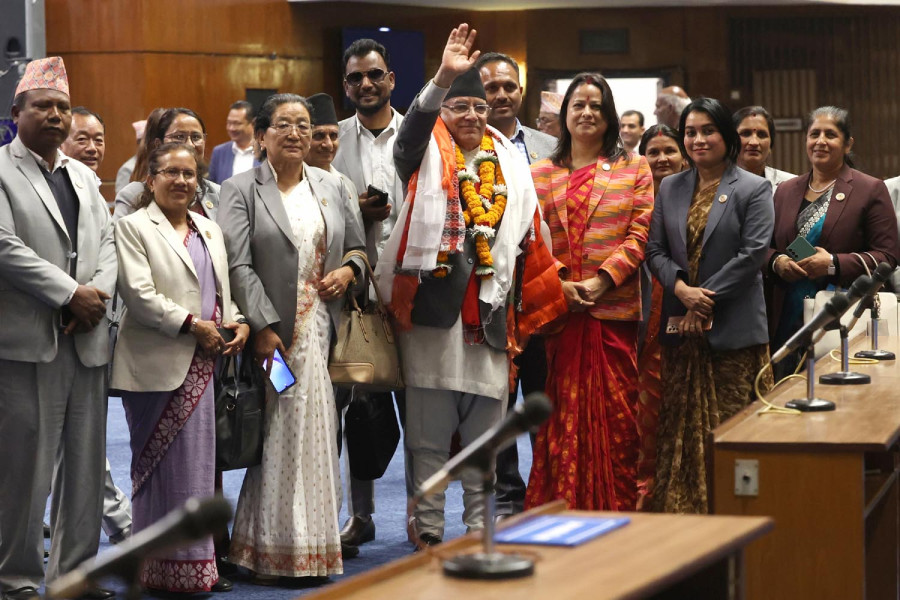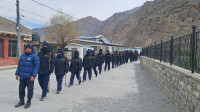Politics
Dahal wins the confidence of House, third time in 14 months
His margin of victory has sharply shrunk from the first floor test held in January last year. The way lawmakers traded barbs on Wednesday suggests a rocky road ahead.
Anil Giri
In a House session high on drama, Prime Minister Pushpa Kamal Dahal on Wednesday won his third consecutive vote of confidence in just 14 months. There were also clear indications of diminishing trust in him, compared to the results of the two earlier confidence votes.
After ending his year-long partnership with the Nepali Congress, Dahal sought a vote of confidence on Wednesday and secured a majority. However, the level of support has notably declined. Dahal had obtained 268 votes in January 2023 followed by 172 in March same year. On Wednesday, he secured just 157 votes—and that too with some difficulty.
Dahal received 157 votes in the 275-member Parliament; 110 lawmakers voted against him while a member abstained. A total of 268 lawmakers were present in Wednesday’s meeting of the House of Representatives. The prime minister required at least 138 votes to win the trust motion.
Ahead of Wednesday’s vote of confidence, some leaders from the ruling alliance expressed their dissatisfaction at the recent political changes and Dahal’s repeated changes of stance over the last 14 months. This suggests Dahal has a difficult path ahead, with the pressing challenge of managing his coalition partners and their frustrations.
Only a few parties in the ruling alliance, like the Rastriya Swatantra Party, and some independent lawmakers supported the prime minister’s bid without putting forth critical views.
CPN-UML Chairman KP Oli supported the bid and asked the main opposition, the Nepali Congress, to vote in favour of Dahal. Oli also extended an offer for talks with Congress President Sher Bahadur Deuba from the same podium. In response, Dahal went as far as challenging both the Congress and UML to forge their own alliance.
The prime minister blamed the Congress for the termination of their year-old partnership. Dahal cited several instances and reasons for his decision to end the alliance with the Congress, including not getting enough support from the party to improve service delivery and performance. Dahal repeatedly used the term ‘betrayal’ and claimed that he never betrayed the Congress. “But yes, Oli ji can accuse me of betrayal,” he said.
Rajendra Pandey, a lawmaker from the CPN (Unified Socialist), another member of the new ruling coalition, termed Dahal’s attempt to change the coalition partners frequently as “immoral” and accused the prime minister of forging a new four-party alliance on March 4 by ignoring his party.
The Unified Socialist was formed in 2021 following a split in the CPN-UML after the then prime minister and UML chair Oli dissolved Parliament, twice, ignoring the suggestions of his party leaders against doing so.
While opposition party leaders and others who stood against the vote of confidence came down harshly against the prime minister, from the ruling pirates it was the prime minister alone who defended his decision to change the political course and restructure the cabinet.
While giving his vote of confidence to Dahal, Unified Socialist's Pandey said: “I went to meet the prime minister on March 1 before flying to Japan. Two days later, I came to know that the coalition had changed and four parties had signed the agreement. We, the Unified Socialist, revolted against the anarchy of one man in the party [CPN-UML], formed our own party, and supported you [which was tantamount to] taking poison. But you abandoned us just like a flooded river tosses driftwood on the banks. What could be more unethical than this.”
Pandey also called the prime minister unreliable.
Initially, the Unified Socialist was hesitant about joining the new ruling alliance. It was only after intense pressure from Dahal and Oli that the party decided to join the government.
It is rumoured that there is an agreement between Dahal, Oli and Unified Socialist Chairperson Madhav Kumar Nepal to lead the government by turns, with each serving as prime minister for 15 months.
“After 15 months, Nepal will be the prime minister,” claimed Metmani Chaudhary, the chief whip of the Unified Socialist. “Then Oli will take over.”
But UML chair Oli denied having such an agreement with Dahal and Nepal.
“There is no agreement to lead the government on a rotational basis,” said Oli while addressing the Parliament on Wednesday, adding that he has no interest in becoming prime minister again.
He dismissed some media reports on the division of the prime minister’s term as rumours.
Oli even offered the Congress chief Sher Bahadur Deuba to come forward for talks.
“My name has been dragged into the race for prime minister,” said Oli. “But whoever becomes the prime minister, it doesn’t matter to me.”
The way the ruling parties are feuding right at the start, seeds of division have already been sown, a UML lawmaker remarked.
“Although ruling party leaders gave the vote of confidence to Dahalji, there is a deep mistrust and crisis of confidence within the ruling coalition,” he said.
“And Oli gave a blank cheque to the Congress, demonstrating that the real parliamentary strength lies with him and that he is capable of ushering in political change.”
“Let’s sit together and talk. This is my offer to the Nepali Congress. But it seems the UML has been relegated to an ‘untouchable’ status by the Congress. Once again I urge Sher Bahadur ji, let’s sit and talk,” said Oli.
Earlier too, Oli had reached out to Deuba for talks to discuss a possible political alliance. But Deuba refused to meet Oli fearing it could create a rift in the Congress-Maoist alliance.
Meanwhile, Congress General secretary Bishwa Prakash Sharma raised a question before the prime minister Dahal, “What would be your fate if those who were betrayed by you came together?”
“Last year, the UML was in opposition and now we find ourselves in the same position,” said Sharma. “If both of these parties, who were betrayed by you come together, what would happen to your chair?”
Rajendra Lingden, the chairman of the Rastriya Prajatantra Party, which is not a part of the ruling coalition, also came down heavily on Dahal as well as the present political system and the constitution, highlighting mounting frustrations among the people against the federal republic setup.
Lingden went on to question the integrity of UML chief Oli and Rastriya Swatantra Party chair Rabi Lammichhane who has joined the government as deputy prime minister and minister for home affairs.
“Trying to forge another alliance could be the last mistake of your life,” Lingden warned the prime minister from the podium. “Next time, you won’t have time to correct your mistakes.”
Provoked by the criticisms, Prime Minister Dahal dared the Congress and UML to join hands and said he would not be deterred.
Dahal said his party would happily sit in the opposition.
“Earlier, they put price tags on our heads. They were all together. Alliances are formed if they are politically beneficial and serve the interests of the nation and the people. If you hold opposing views from the alliance, you are free to step away. We have been practising the politics of ‘negation of negation’. What we are aiming for now is the highest level of unity. I have taken huge risks while forging this new alliance,” said Dahal.
Rajendra Pandey’s statement that the present alliance was built on the foundation of immorality and does not have a future, also irked the prime minister. The prime minister appeared visibly angry while responding to the queries of both the ruling and opposition leaders.
Similarly, echoing concerns of Congress leaders, Pandey also asked Dahal what would be the fate of the alliance if the Congress and the UML came together and what would happen to the transitional justice process if the Congress refused to cooperate.
Raj Kishor Yadav, a senior leader of the Janata Samajbadi Party, also criticised Dahal’s way of doing things and vented ire against the frequent changes in the coalition. Yadav’s party has two ministers including one deputy prime minister in the government despite a big dispute in the party over joining the ruling coalition.
Yadav pointed to people’s mounting frustrations and urged the prime minister to take a lead in addressing their grievances.
“Don’t try to change the coalition time and again. If you repeatedly experiment with politics, people will one day say enough is enough. I had seen a glow in your face when you sought the vote of confidence last time. This time, I could see no such glow or confidence,” said Yadav.
Swarnim Wagle of the Rastriya Swatantra Party also fell short of extending wholehearted support to Dahal.
“We have reservations about the people’s war, but we support the issue of ensuring the rights of the marginalised people,” said Wagle. “As the prime minister is keen on doing something good, we are going to take a risk and support him.”
“There are views that we as a new party should not join the government before the next elections when we can secure a majority… But we took the risk of joining now in order to gain some experience,” said Wagle.
He also recalled his conversation with the prime minister three months ago, where he and his party president Lamichhane discussed taking meaningful actions in support of social justice.
Clarifying the rationale behind supporting Dahal, he added, “We saw that the prime minister had the appetite to do something for the country.”
Though her party voted in Dahal’s favour, Ranjita Shrestha of the Nagarik Unmukti Party urged the prime minister not to forget the role of small parties. Leaders of fringe parties and individual lawmakers, both those in support of and opposition to the prime minister’s bid, also put forth their views.
The vote breakdown
Among those voting for Dahal were 75 lawmakers from the CPN-UML, 32 from the Maoist Centre, 21 from the Rastriya Swatantra Party, 12 from the Janata Samajbadi Party, 10 from the Unified Socialist, 4 from the Nagarik Unmukti Party, 1 from the Aam Janata Party, as well as independent lawmakers Amaresh Kumar Singh and Yogendra Mandal.
Among those voting against him were 87 lawmakers from the Nepali Congress, 13 from the Rastriya Prajatantra Party, 5 from the Janamat Party, 4 from the Loktantrik Samajbadi Party, and one lawmaker from the Rastriya Janamorcha.
The Nepal Workers and Peasants Party’s Prem Suwal abstained from the vote.




 10.17°C Kathmandu
10.17°C Kathmandu















